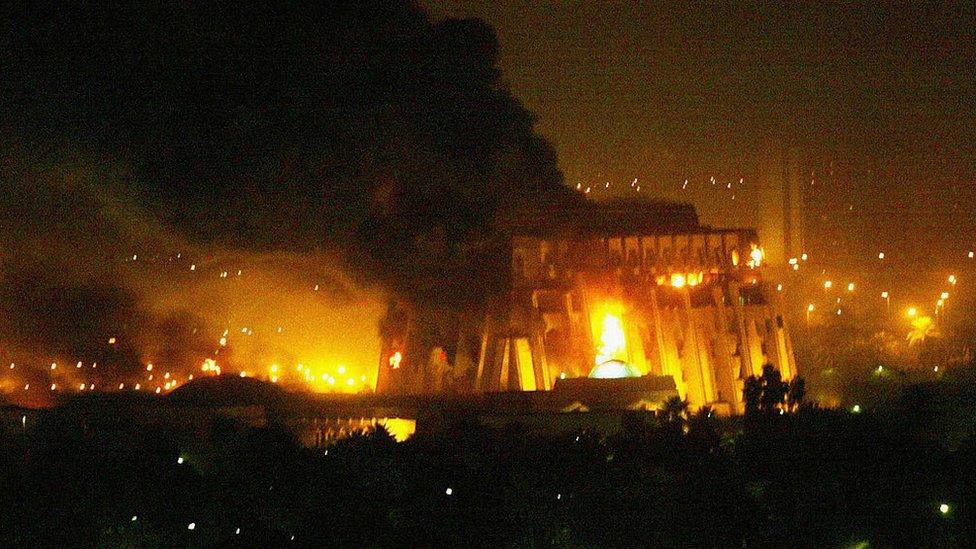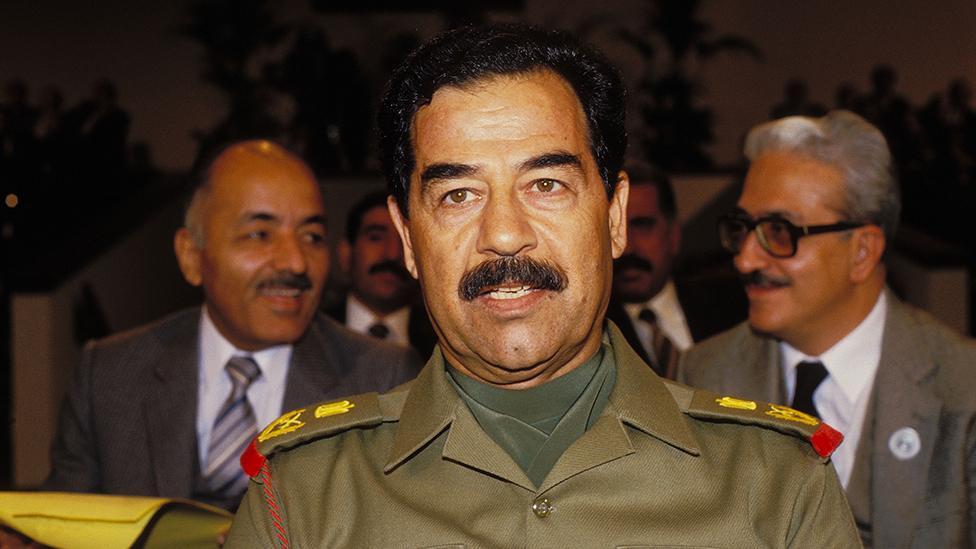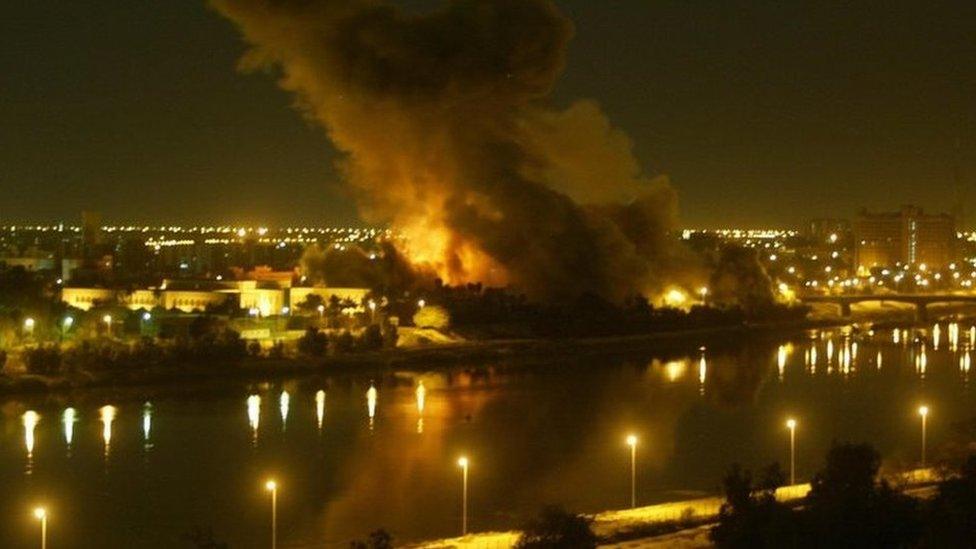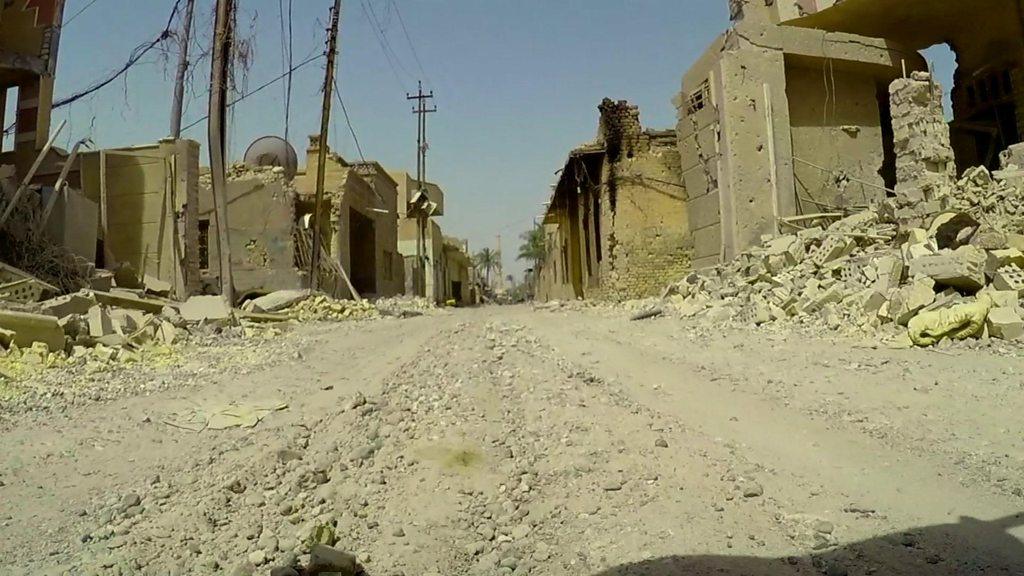The Iraq War: Five voices from Wales, 20 years on
- Published

Fires burned around Saddam Hussein's Council of Ministers building during the first wave of attacks in March 2003
The bombs that lit up the night skies of Iraq in March 2003 were described by military powers in the west as "shock and awe".
It marked the start of the US and UK-led invasion of the country and the removal of leader Saddam Hussein.
The British public were told Iraq had, and was developing, weapons of mass destruction that posed an imminent threat to the UK and its allies.
Thirteen years later, Sir John Chilcot's inquiry into the war found intelligence "had not established beyond doubt either that Saddam Hussein had continued to produce chemical and biological weapons or that efforts to develop nuclear weapons continued".
Now, 20 years on, some of those involved in the war, or directly affected by it, look back on the conflict and consider its legacy.
'War cost me my son'
'My son died in a hell-hole in Iraq'
On 24 June 2003, three months after the initial invasion, L/Cpl Thomas Keys from Llanuwchllyn, near Bala in Gwynedd, was killed near Amara in south-east Iraq when British Military Police were attacked by a mob of Iraqi civilians in a dispute over British patrols in the area.
Tom's father, Reg Keys, said his son and his fellow soldiers were sent into a "hell hole" with "no working radio, no satellite phone, no flares, no morphine, no grenades and just 50 rounds of ammunition".
Mr Keys would come to believe the UK had been taken to war on a false pretence and hoped in his heart "that one day the prime minister may be able to say sorry".
Born of two worlds
Welsh-Iraqi Hussein Said says the racism he endured during the war made him hate Wales for a time
Having an Iraqi father and a Welsh mother proved to be a confusing time for Hussein Said.
Only 10 years old, he found himself targeted by schoolyard bullies and said the racism he experienced made him "hate" Wales for a time.
"It was something I found difficult to reconcile - that Iraq/Wales identity".
'We went to war on a lie'
Iraq War based on lies, minister claims
Lord Peter Hain was a member of Tony Blair's cabinet at the time and the former Secretary of State for Wales now regrets his decision to vote for the war.
"I believed the intelligence, because it was that Saddam Hussein had weapons of mass destruction, and I knew he'd used them [before].
"And tragically, that intelligence was shown to be completely false. And so we went to war on a lie."
'We didn't change a lot'
"There were a lot of things wrong about it," says Lee West two decades after the invasion
Lee West, from Swansea, signed up for the Royal Marines in 2002 and found himself deployed to Iraq three years after UK military involvement should have ended.
"We were in the transition phase for the country where, yes, Saddam had gone, but how's the country now going to operate?"
Twenty years on, Lee has mixed feelings about the outcome: "It was, yes, successful, and we did a lot of things, changed a lot of things within what we were asked to do, but in the grand scheme we didn't change a lot."
The soldiers sent to war
Soldier Liam Spillane has doubt over the war's success
Liam Spillane joined the Army in 1999 and was deployed to Iraq in 2005 - despite trying to be "that approachable soldier" for Iraqis, dangers on the ground played on his mind.
"I remember one night I thought I'd had a dream. I dreamt that I was alone on a patrol and I was calling out, 'don't leave me, I'm all alone.'
"It turns out that I'd actually woken up shouting 'don't leave me' and things like that, and it was really, really scary."

When UK troops left Iraq in 2009, more than 200 British citizens and 150,000 Iraqis had died, with more than one million people displaced.
Mr Keys believes the war was a mistake: "We didn't need to go to war with Iraq. It was a war of option, not necessity.
"It [war] has to be the last and final option. When all other avenues have failed. But with Iraq it was almost a first option."
Related topics
- Published13 March 2023

- Published5 July 2016

- Published4 July 2016
